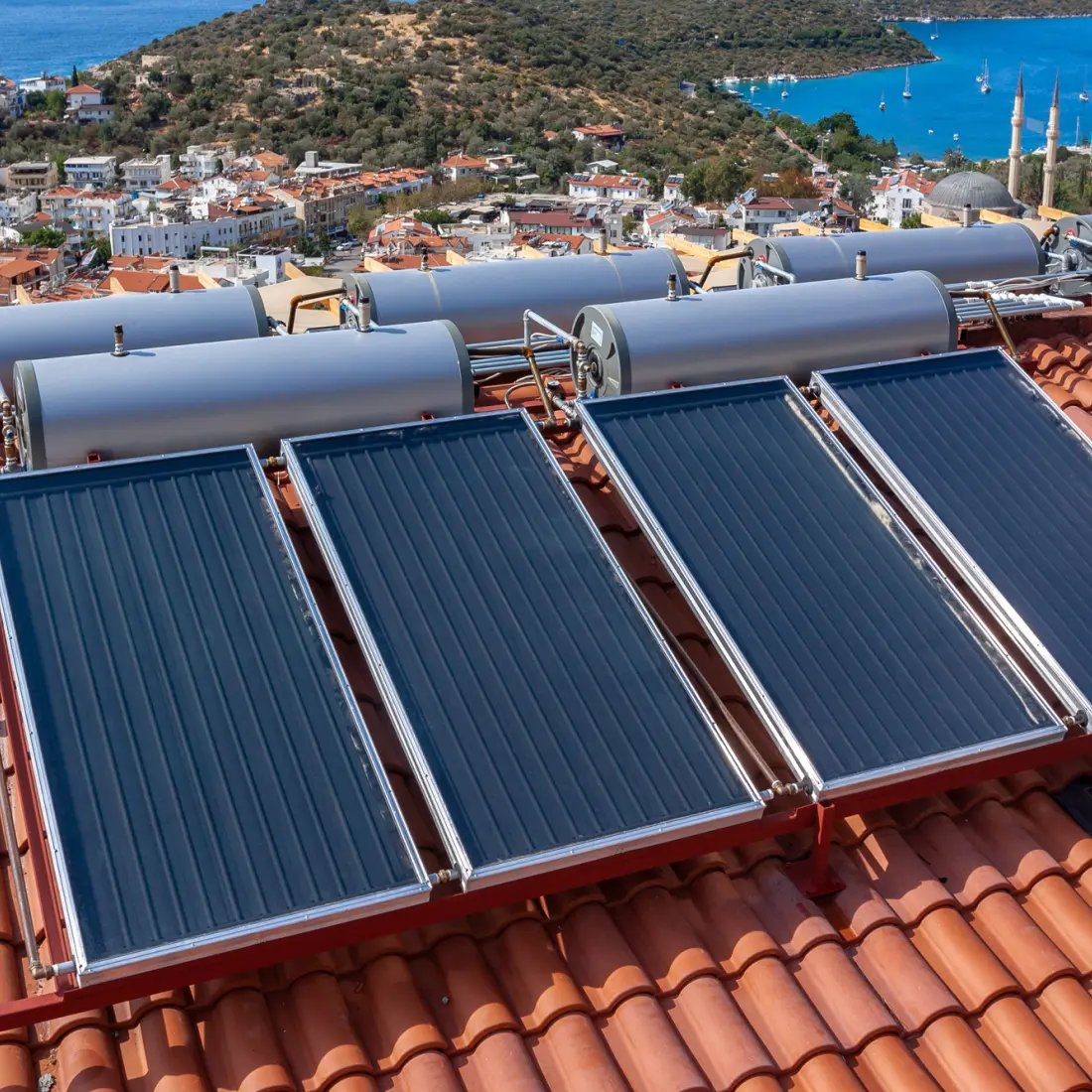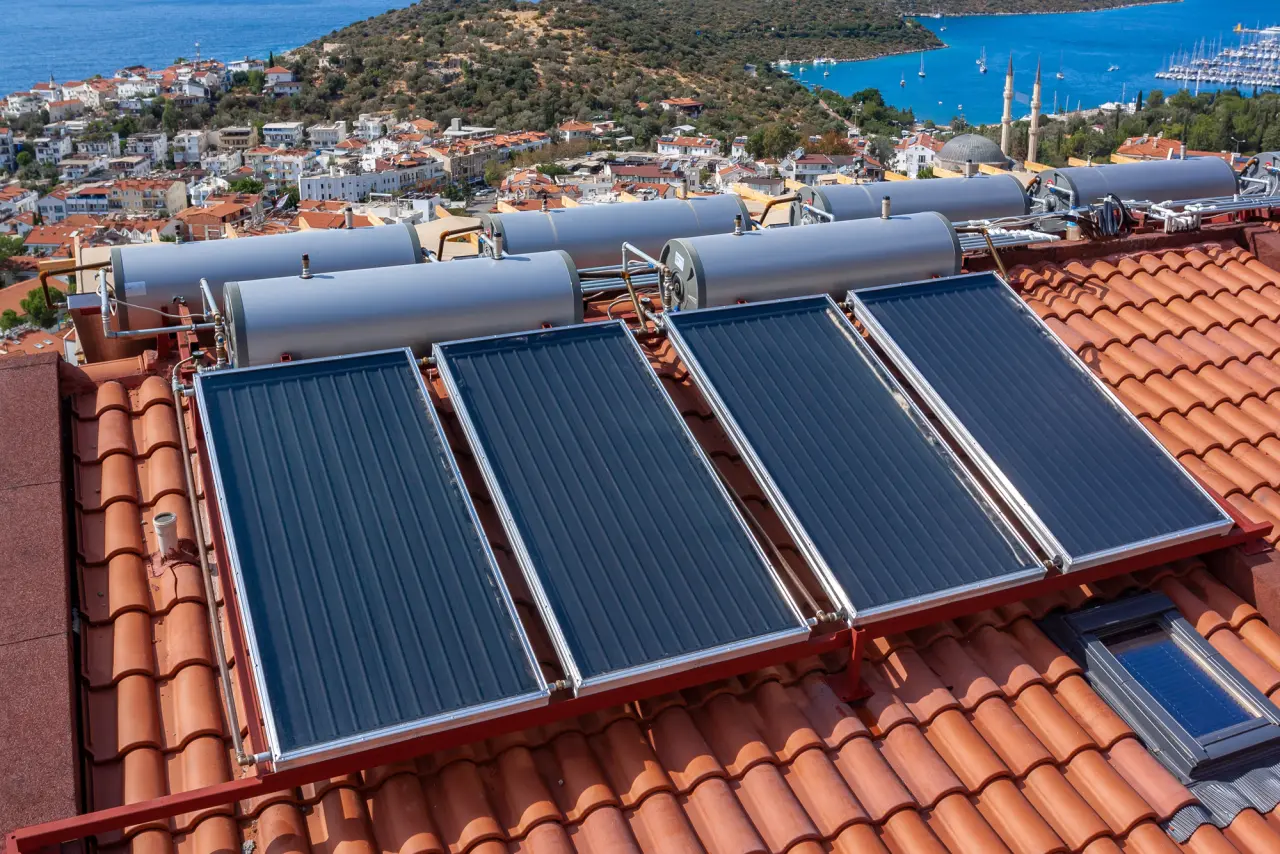Solar powered water heaters. A comprehensive guide to their value and efficiency


Solar water heaters harness the sun’s rays to create hot water for your home. This is considered an environmentally friendly and cost-effective way to enjoy hot water. They can be used in almost any climate — not just regions with a lot of sun and heat.
Demand for solar water heaters is rising as more homeowners and potential buyers seek out renewable energy solutions. Learn more about this technology and decide whether investing in a domestic solar hot water system is right for your home.
How solar water heaters work
Every solar water heater has a collector, a storage tank, and a circulation system. The only difference in systems is how these three elements are configured.
- The storage tank holds water until it’s ready to be used.
- The collector harvests the sun's energy to heat the water.
- The circulation system moves the water through the collector and into the house.
Collectors might use dark tanks to heat water, flat panels with copper tubes, or even large glass tubes to heat water. The collectors heat water through the sun’s rays and then release it into a storage tank or the pipes of the house.
Active vs. passive systems
There are two different options for choosing a solar water heater: an active or passive model. An active solar water heater uses a pump to circulate water through your home, while a passive model relies on thermodynamics. With passive systems, water moves naturally through convection as it heats up.
Active systems are more common and they’re more efficient, which means you’re more likely to install one of these options in your house. Passive systems are more affordable, but they’re less efficient. This means you might not get the hot water you need.
Direct vs. indirect systems
If you install an active solar water heater, you can choose between two different circulation systems: direct and indirect. Direct circulation systems are ideal for climates where it rarely freezes because the pumps push water through collectors and throughout the home. If you live in a colder climate, you might benefit from an indirect system, which incorporates anti-freeze into the process to keep the water moving.
The use of antifreeze in indirect systems allows almost any household to use solar water heaters, busting the myth that these are only beneficial in hot climates.

Benefits of solar water heaters
There are two main reasons why people invest in solar water heaters: to reduce their environmental impact and to save money on utility costs. Here’s how this investment supports both efforts.
Environmental impact
Investing in a solar water heater can help a household reduce its overall carbon footprint. In 2023, fossil fuels accounted for 60% of electricity generation in the United States. The electricity used to heat your water likely comes from coal or natural gas. By reducing your electricity usage, you can cut back on fossil fuel dependency.
One household changing their water heater to a solar model might not make a difference, but millions of Americans switching can have a big impact.
Energy savings
Energy Star estimates that switching to a solar water heater can eliminate half of customers’ hot water costs each year compared to traditional heating methods. The average household can save around $140 per year on water costs, which is $2,900 over the life of the system. Homeowners who also invest in a backup electric water heater tank can save $280 per year or $5,200 over the system’s lifespan.
Adoption of solar and other renewables
Americans can’t access the internet without electricity, so addressing energy insecurity is essential to providing financial services to rural areas. One way to bring energy to rural residents is through microgrids.
Microgrids use community-owned, locally-produced solar energy to support rural communities. These smaller grids provide more stability if natural disasters threaten the power grid. When the power goes out, rural communities are often the last ones to have it restored. Microgrids allow these areas to manage their own power source and make repairs whenever needed.
While solar energy is a tremendous opportunity for rural communities, installing it may come with some challenges. Materials may take longer to ship to their destinations and communities might have specific needs based on the environment. Rural terrain isn’t always flat, making it hard to install panels. Ground mounts might need to be built on rocky terrain that is uneven and difficult to balance panels on. Site selection is a key part of developing solar microgrids, so communities need to come together to identify where they want their solar infrastructure.
Another issue can be cost. Fortunately, the Inflation Reduction Act allocated $11 billion to bring clean energy to rural areas. It also contributed $2 billion to the Rural Energy for America Program (REAP), which supports initiatives to invest in renewable energy or upgrade inefficient systems.
Regulators have the power to support solar expansion and make access to energy cleaner, more sustainable, and better than ever before for rural Americans.
Drawbacks and limitations
Despite the significant benefits of installing solar water heaters, these systems have their limits. Like other solar power systems, there’s a significant installation cost. In 2023, homeowners paid around $4,000 for their solar water heaters. Though you might find a better deal, these systems will cost at least a few thousand dollars. Conversely, traditional water heaters can be installed for less than $2,000 in many areas.
On top of the initial installation price, you’ll also need to budget for maintenance and repair costs. Ask your installation company if they offer annual maintenance plans, which will likely cost a few hundred dollars.
These systems can be installed anywhere, regardless of climate, but they still perform better on warm, sunny days. A stretch of bad weather might make your system less efficient. This will also reduce the return on investment for the project. You might not notice as much savings if you need to use your backup electric water heater more often than you want.
Is a solar water heater right for you?
Investing in renewable energy is a personal investment. Here are a few things to consider when deciding if a solar water heater is right for you:
- Climate: consider how efficient the solar water heater will be based on the site location and if you should invest in an indirect system to keep using the water heater through the winter.
- Home size: The Department of Energy estimates the cost of this project will be around $100 per square foot. Consider this cost as you set a budget.
- Budget: identify how much you can pay for this project and how much more it will cost than a standard water heater.
- Savings: evaluate your potential electricity savings compared to the cost to see if this project is a better option in the long run.
Your family’s habits can also determine if this is the best option. If you have a big family with kids, aging relatives, or in-laws living in your home, you might need a bigger water heater or two solar water heaters.
Assessing your home's suitability
If you decide to proceed with this project, talk to local solar water heater contractors about your home’s suitability. Some of the factors they’ll consider include the age of your roof and the orientation of your home. They will also look at your property and make a note of any surrounding trees that could provide too much shade. Even if you have a beautiful new roof, your home might not be suitable for a solar water heater if you live in a frequently shaded area.
Maintenance and longevity
Solar water heaters are designed to last 20 years, but their longevity depends on how well you care for your system. Even the most durable solar water heaters need regular maintenance and servicing. A few maintenance and repair best practices include:
- Make sure trees don’t grow over your collector, creating unwanted shade.
- Clean your collector to ensure dust and dirt won’t limit energy absorption.
- Check your plumbing, wiring, and ductwork connections.
- Make sure your water heater maintains proper insulation.
- Inspect your roof frequently to make sure it’s in good working order.
- Check the temperature and water pressure levels for any drops in performance, which are warning signs that something needs to be repaired.
A solar water heater can be a valuable asset to your home. It can lower your energy bills and support your sustainability efforts. However, it still needs to be properly maintained and chosen specifically to accommodate your home’s climate and performance needs. Choose the best option to enjoy hot water at affordable rates.